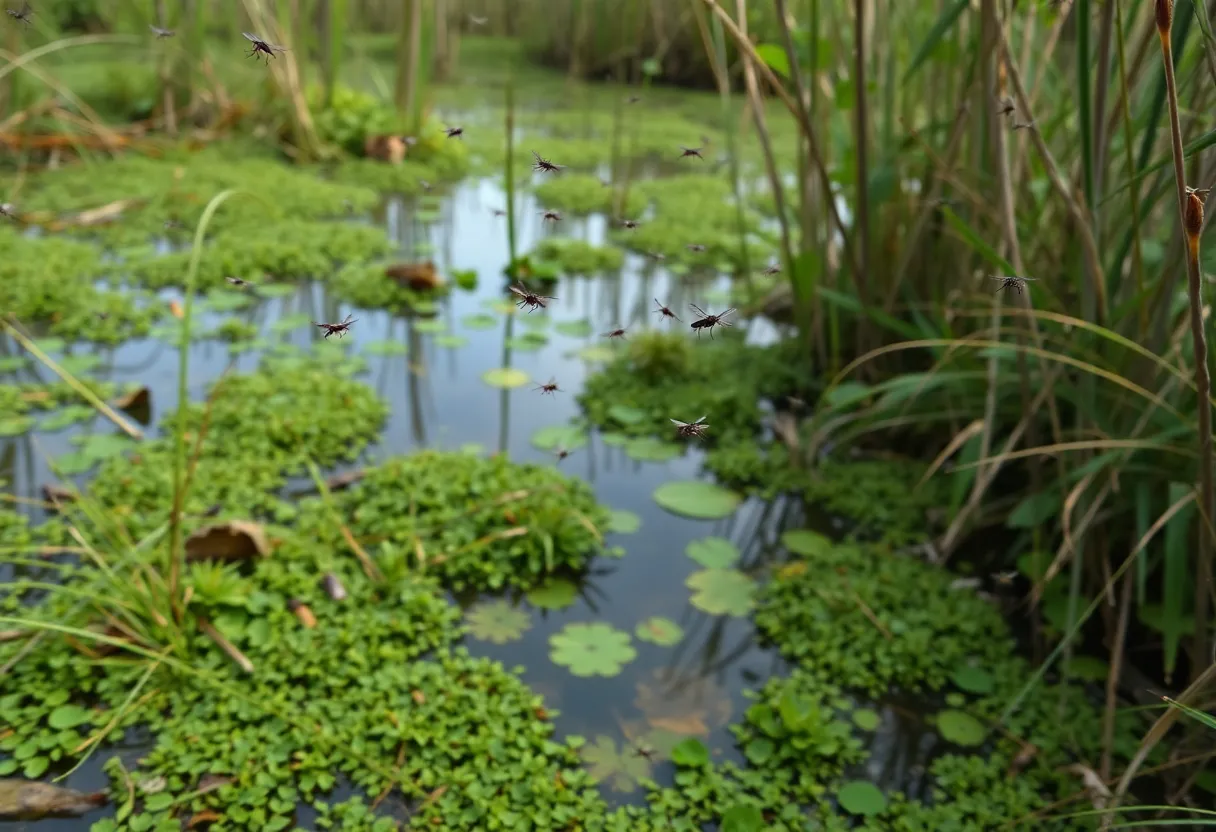News Summary
Rhode Island health officials are reporting a rise in mosquito-borne illnesses, specifically Eastern Equine Encephalitis (EEE) and West Nile Virus (WNV). With several cases detected in local mosquito populations, the state is urging residents to adopt preventive measures and reduce mosquito habitats around their properties. Heightened awareness is critical, particularly given the serious health risks associated with these diseases. Health officials recommend smart scheduling for outdoor activities and the use of protective clothing and repellents as precautionary measures during this peak mosquito season.
Rhode Island health officials are alerting the public about an increase in the risk of mosquito-borne illnesses this season. The state’s Department of Environmental Management (DEM) and Department of Health (RIDOH) have reported a significant uptick in cases of Eastern Equine Encephalitis (EEE) and West Nile Virus (WNV), prompting the need for heightened awareness and preventive measures.
This season, Rhode Island has detected 17 cases of EEE and five cases of WNV in local mosquito populations. Additionally, one human case of WNV was confirmed in Providence County in August. The rise in mosquito-borne diseases is concerning, especially as neighboring states, Massachusetts and Connecticut, are also reporting notable cases of EEE and WNV.
EEE is particularly alarming due to its mortality rate, with approximately 30% of EEE infections resulting in death. Although WNV is more common, many individuals infected with the virus do not show symptoms, making awareness and prevention crucial.
To combat the rising mosquito populations, DEM is taking action by conducting aerial applications of mosquito larvicide across 3,000 acres in the Great Swamp and Chapman Swamp areas. This aims to minimize the risk of disease transmission by reducing mosquito breeding sites. In addition, residents are advised to conduct checks around their properties for standing water and to eliminate any potential mosquito habitats.
Health officials recommend adopting what they call “smart scheduling” for outdoor activities. Residents are encouraged to plan events away from peak mosquito activity periods, which typically occur during dawn and dusk. Protective measures such as using EPA-approved insect repellents, wearing long-sleeved clothing, and installing screens on windows and doors are also strongly advised, especially for vulnerable populations, including children and the elderly.
The overall mosquito risk level in Rhode Island has been classified as elevated, highlighting the importance of personal responsibility in disease prevention. DEM regularly traps and tests mosquitoes for various diseases and provides weekly updates throughout the mosquito season, which lasts until the first hard frost.
Currently, RIDOH has not reported any human cases of EEE in the state this season, despite the high risk levels. Officials stress that the unpredictable nature of EEE outbreaks may be influenced by environmental factors and climate change, adding another layer of complexity to public health efforts.
Residents need to stay vigilant, especially since many infected individuals may not exhibit symptoms of WNV. The presence of the Asian Tiger Mosquito, known for its ability to transmit various diseases, particularly in urban areas, highlights the necessity for community awareness and preventative measures to combat these health risks.
In conclusion, Rhode Island health officials are urging the public to take necessary precautions against mosquito bites to protect themselves and their families from mosquito-borne illnesses. The proactive steps taken by DEM, combined with community cooperation, can help mitigate the impact of these diseases during the peak mosquito season.
Deeper Dive: News & Info About This Topic
- Brown Daily Herald
- Wikipedia: Mosquito-borne disease
- Providence Journal
- Google Search: Mosquito-borne diseases
- What’s Up Newport
- Google Scholar: Mosquito-borne diseases
- Rhode Island Current
- Encyclopedia Britannica: Mosquito
- GoLocalProv
- Google News: Mosquito risks Rhode Island

Author: STAFF HERE PROVIDENCE WRITER
The PROVIDENCE STAFF WRITER represents the experienced team at HEREProvidence.com, your go-to source for actionable local news and information in Providence, Providence County, and beyond. Specializing in "news you can use," we cover essential topics like product reviews for personal and business needs, local business directories, politics, real estate trends, neighborhood insights, and state news affecting the area—with deep expertise drawn from years of dedicated reporting and strong community input, including local press releases and business updates. We deliver top reporting on high-value events such as WaterFire, Rhode Island International Film Festival, and Rhode Island Comic Con. Our coverage extends to key organizations like the Greater Providence Chamber of Commerce and Providence Warwick Convention & Visitors Bureau, plus leading businesses in finance and manufacturing that power the local economy such as Citizens Financial Group and Textron. As part of the broader HERE network, we provide comprehensive, credible insights into Rhode Island's dynamic landscape.





